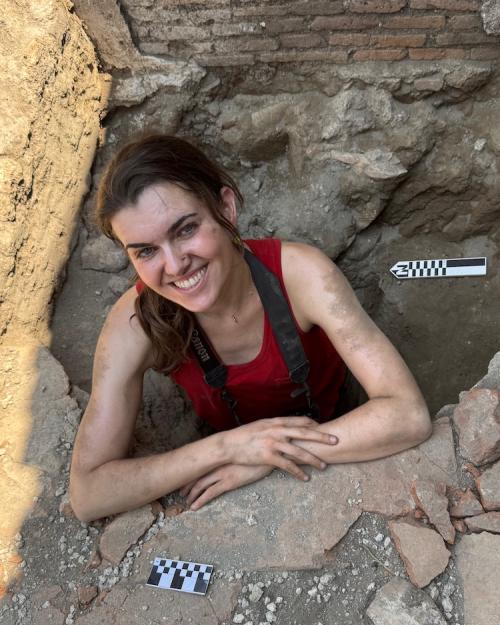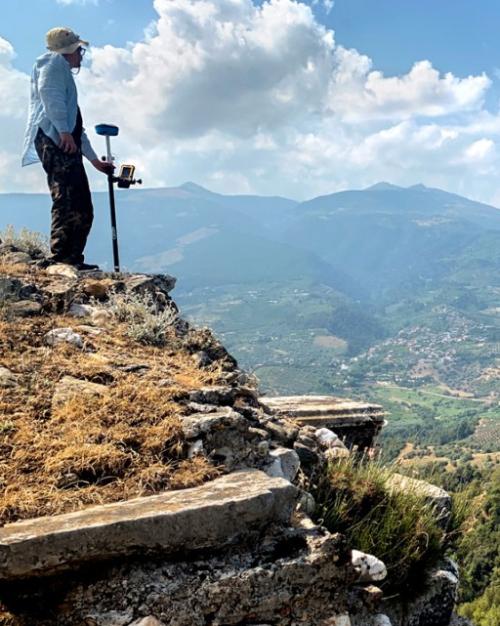The Cornell Classics Department is excited to welcome our newest Post-Doctoral Associate , Mathura Umachandran. Mathura completed her PhD at Princeton University in 2018, and previously held a post-doctoral position at the University of Oxford from 2018-2019 and a Visiting Fellowship at the Institute of Classical Studies in London from 2019-2020.
Mathura’s research mainly lies in the field of classical reception in which, she says, she likes “to cultivate a theoretically juicy set of research interests.” In particular, she is interested in 20th century German Jewish thinkers and their interaction with classical antiquity during and after World War II. Asking questions such as, “How did people like Theodor Adorno, Erich Auerbach, and Hannah Arendt think about ancient texts, and how did they understand themselves to be part of a German intellectual tradition that was conspicuously philhellenic?”, Mathura explores the ways in which such thinkers “demand of themselves, the texts they turn to, and their reading communities a scrupulous ethical self-critique.” Recently she is also undertaking pioneering work in classics and critical race studies. An article in progress on Kara Walker’s ‘Fons Americanus’ continues this work and combines it with her developing interests in writing about contemporary art.
This semester Mathura is teaching a seminar at Cornell titled “Homer and Global Modernity”. She admits that the course has “perhaps a scandalously little amount of assigned Iliad and Odyssey reading”, but explains, “What’s more essential to me is that the ‘global modernity’ part is thought through properly, and that we wrestle with denaturalizing the idea, and the political commitments of the idea, of Homer as universal or the finest example of world literature.” The course began with understanding the concept of “modernity” and its colonial and imperial origins. Already within the first month of classes, the class has “reprised the canon wars as they played out in the early 2010s, and turned to the earlier Black Athena debates to grapple with the cultural politics of reading head-on.” The course will move through 20th and 21st century visual artists, poets, and thinkers and how they respond to Homer, ending with two texts which Mathura describes as “not advertising their reception of Homer loudly but attending to human suffering borne of displacement, war, and empire, i.e. the things that the Homeric poems do well” - Toni Morrison’s Home and Gaiutra Bahadur’s Coolie Woman: The Odyssey of Indenture.
The course aims to have interdisciplinary appeal, addressing questions that are important both within and outside of classics, such as, “Why do the Greeks continue to be a part of (some) post-colonial writers’, women artists’, and critics from the Global Souths’ tool kits?” and “Why should Homer show up at all in a world shaped by empire, unless reading these poems and their afterlives can tell us something about the historiographies of colonial subject formation?” Speaking to the interdisciplinary nature of the syllabus and the range of departments represented among her students, Mathura says, “I’m committed to the idea that classicists cannot answer these questions alone - we need the training and expertise of other disciplines.”
Mathura acknowledges the special challenges that the Fall 2020 semester poses, commenting that she is doing her best to “balance out my enthusiasm for the readings with being acutely aware of the stresses in my students’ lives, not least that this might be their 58th consecutive hour on Zoom.” But she looks forward to the opportunity that teaching offers to “read familiar texts anew because of discussing them with your students,” and notes that she has already engaged in interesting discussion with students which inspired her to look at old texts in new ways and re-frame familiar questions.
Mathura is delighted to be at Cornell, where two of her most important intellectual influences have come from: the New German Critique journal and Black Athena. She is also excited to be a postdoctoral fellow at the Society for the Humanities because, she says, “I stand to learn so much from the other fellows who are developing this year’s theme of Fabrication in richly diverse directions. There are poets, choreographers, musicologists, anthropologists, political theorists, bookmakers (to name a few of the areas of expertise!) thinking through making and fashioning in gorgeous ways that I could not have anticipated.” She looks forward to getting to know her colleagues and students, to “making an intellectual home in a close-knit community”, and to trying out cross-country skiing when winter rolls around.
Welcome, Mathura!





